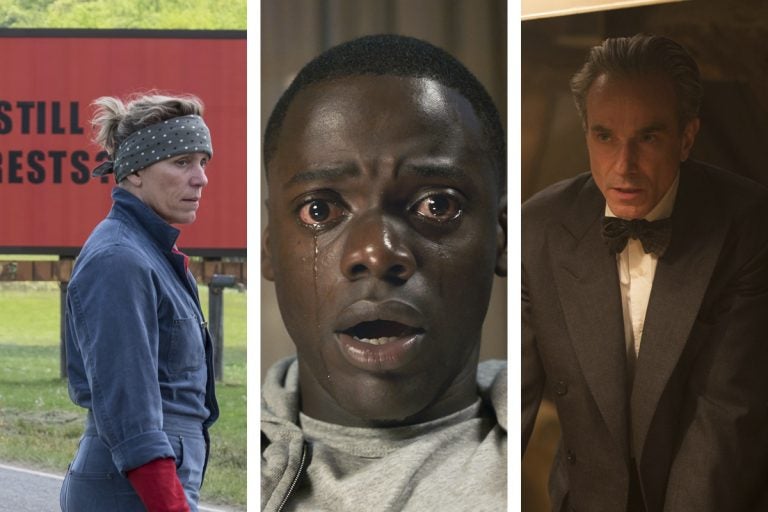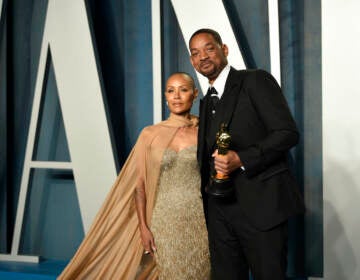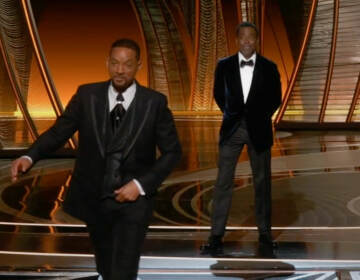What the Oscar winner for best picture will tell us about 2017
For better or worse, the winners of the Oscar for best picture are a pretty good reflection of the year that was.

From left: Frances McDormand as Mildred Hayes in “Three Billboards Outside Ebbing, Missouri” from Fox Searchlight Pictures (Fox Searchlight Pictures via AP); Daniel Kaluuya as Chris Washington in Universal Pictures’ “Get Out” (Universal Pictures via AP); Daniel Day-Lewis as Reynolds Woodcock in “Phantom Thread,” a Focus Features release (Laurie Sparham/Focus Features)
What kind of year has it been?
For better or worse, the winners of the best picture Oscar are a pretty good reflection of the year that was. While innumerable observers have questioned the relevance of the award show, I think the Oscars have a stellar track record at capturing the spirit of a given year.
In 1976, for instance, several classics were released that fit the decade’s mold for serious, gritty, and dour cinema: “All the President’s Men,” “Network,” and “Taxi Driver.” The award ultimately went instead to “Rocky,” a far more uplifting film that represented the bicentennial enthusiasm that briefly took hold of the nation.
In 2009, the academy didn’t even seem to want to acknowledge the turmoil of the prior eight years of the Bush White House. “The Dark Knight” with its anarchist/terrorist villain was snubbed, as was “Wall-E” and its environmental message. Rather, “Slumdog Millionaire” took home the award, perhaps an expression of hope among voters that the election of Barack Obama would lead to a happier, multicultural America.
This corollary was arguably most prevalent last year as “La La Land” was poised for a historic sweep. A musical love letter to Hollywood, that most American of cities, the film was perfectly attuned to the academy’s tastes. Sure, 2016 was a tumultuous year, but it would all turn out right in the end. Right? Just as millions of Americans spent Election Night dumbstruck, however, so too were viewers confused when “La La Land” was declared, and then immediately undeclared, the winner. The more serious and weighty “Moonlight,” decidedly as black as “La La Land” was white, swooped in at literally the last moment to take the gold.
So what can Oscar tell us about the kind of year 2017 was? Well, that’s the catch. We won’t know until Sunday night. What we can do, though, is break down what impression each of the plausible victors might leave.
Of the nine films nominated for best picture, three are widely considered to have no real chance at securing the statue (“Call Me By Your Name,” “Darkest Hour,” and “The Post”), while the remaining six can be divided into three categories.
The front-runners: ‘The Shape of Water’ and ‘Three Billboards Outside Ebbing, Missouri’
There’s a reason we call it “awards season.” The Oscars are just the last in a lineup of guild and foreign awards. If those winners are any indication, the best picture is highly likely to be one of these two films. “The Shape of Water” took home the honors at the PGAs and DGAs, while “Three Billboards” got the SAG, BAFTA, and Golden Globe. The former is a love story set in the 1960s between a mute custodian in a high-security U.S. government lab and the mysterious creature confined there. The latter is a more contemporary tale about a mother publicly pressuring a lethargic police department to find her daughter’s killer.
“The Shape of Water” would be a shot across the bow against those who seek to keep isolated those who are different. It would also alienate audiences thanks to its … how should I put this? Let’s say … bold choices. On the other hand, the female protagonist of “Three Billboards” fits it into today’s Time’s Up culture quite well. Yet critics despise the film’s racial politics. Neither film has really caught on at the box office, either. A victory for one of these movies would suggest a desire to recognize society’s outcasts, although those good intentions are likely to be criticized as a bit outside the mark.
The outsiders: ‘Get Out’ and ‘Lady Bird’
These two entries are far more favored by critics and even movie-goers. “Get Out” became a cultural landmark that’s relevant a year after its release, whereas “Lady Bird” earned headlines for being the best-reviewed movie ever. One realates the harrowing journey of a black man visiting his white girlfriend’s family. The other is a touching tale of a teenage girl’s turbulent relationship with her mom. Respective directors Jordan Peele and Greta Gerwig would both be appropriate avatars for the time: young, talented, and not white guys.
Two problems stand in their way. The first is the makeup of the academy. Even after strenuous efforts, the voting body is still very white and very male. The second is perhaps more surprising as there’s a real possibility that these two movies could cancel each other out. In a bid to prove their progressive bona fides, it’s quite conceivable that the votes are split, and another film could pull a shocking upset.
Should either “Get Out” or “Lady Bird” emerge the victor, the decision would be hailed as a worthy corrective and an acknowledgment of a too-often overlooked segment of the audience as well as the nation.
The long shots: ‘Dunkirk’ and ‘Phantom Thread’
Any other year, these might’ve been our front-runners. “Dunkirk” is both bold and experimental yet also an inspiring World War II story. “Phantom Thread,” meanwhile, is a period-piece costume drama with a superb cast led by (the supposedly retiring) Daniel Day-Lewis. Additionally, directors Christopher Nolan and Paul Thomas Anderson are two are the most beloved filmmakers of their generation and neither has won an Oscar yet.
Furthermore, their odds may not be as long as they seem. Vanity Fair contributor Daniel Joyaux, who successfully predicted the “Moonlight” upset, believes that “Dunkirk” will win thanks to the academy’s unique voting rules. Finally, “Phantom Thread” was one of the biggest surprises when the Oscar nominations were announced last month. The film hasn’t gotten much love from other award shows, so it appears that the academy is particularly smitten.
A win for “Phantom Thread” would produce as many rolled eyes as gasps. Regardless of the film’s merit, viewers will likely interpret such an event as disconnected from any larger meaning. It’s also quite possible that a win for “Dunkirk” would be met with this same feeling, although there’s a case to be made that a tale of surviving to fight the next battle has a ring of #Resistance spirit to it.
We won’t truly know until the winner is at last announced … and maybe not for a few minutes after that.
WHYY is your source for fact-based, in-depth journalism and information. As a nonprofit organization, we rely on financial support from readers like you. Please give today.





